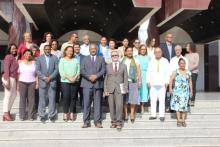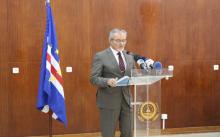Cabo Verde officially declared “polio free”
Praia 02 December 2016 - On the 24th of November 2016, Cabo Verde was officially declared free of Poliomyelitis.
Following the declaration made in by the ARCC (Africa Regional Certification Commission for Polio Eradication), the Minister of Health and Social Security of Cabo Verde, Dr. Arlindo do Rosário, organized a press conference on the 2nd of December to share this important achievement with the whole nation.
The Minister congratulated the entire team of the National Certification Campaign, the Cabo Verde delegation and all those directly or indirectly involved in the preparation of the National Polio Eradication documents, presented in the meeting in Accra, Ghana.
On behalf of the Government of Cabo Verde, the Minister of Health and Social Security expressed his deep appreciation to national and international partners, including the WHO country office and the WHO Regional Office for the African Region, UNICEF, the International Rotary Club, the Red Cross and all health professionals, among others, who all contributed towards this significant achievement.
The WHO county representative, Dr. Mariano Castellón, congratulated Cabo Verde for this remarkable accomplishment and the importance of this historic moment for the national and international public health system. “The declaration” he added, “confirms the effectiveness and the commitment of the government to protect the health of the most vulnerable groups of the population, specifically children under five.”
Mid-October, a technical mission composed of members of the ARCC and the Inter-Country Support Team for West Africa (IST-WA) of the WHO was assigned to Cabo Verde in order to support the Ministry of Health in the preparation of the complete polio eradication documentation.
Cabo Verde has embraced the global polio eradication initiative created in 1988 with a set of health measures including active surveillance of acute flaccid paralysis (PFA), strengthening of routine vaccination and the implementation of national vaccination campaigns among children under five. Since 2001, no cases of poliomyelitis have been reported in the archipelago.
The last two outbreaks of the disease occurred in 1986 with 31 suspected cases not confirmed via of virological diagnosis, and in 2000 with 56 suspected cases, 15 of which were confirmed via laboratory.
In the words of the Minister of Health and Social Security, this is a time of celebration, but the country will have to continue and maintain the routine vaccination coverage level above 95%, strengthen the surveillance of all acute flaccid paralysis (PFA) in children under 15 years and improve its detection indicators.





